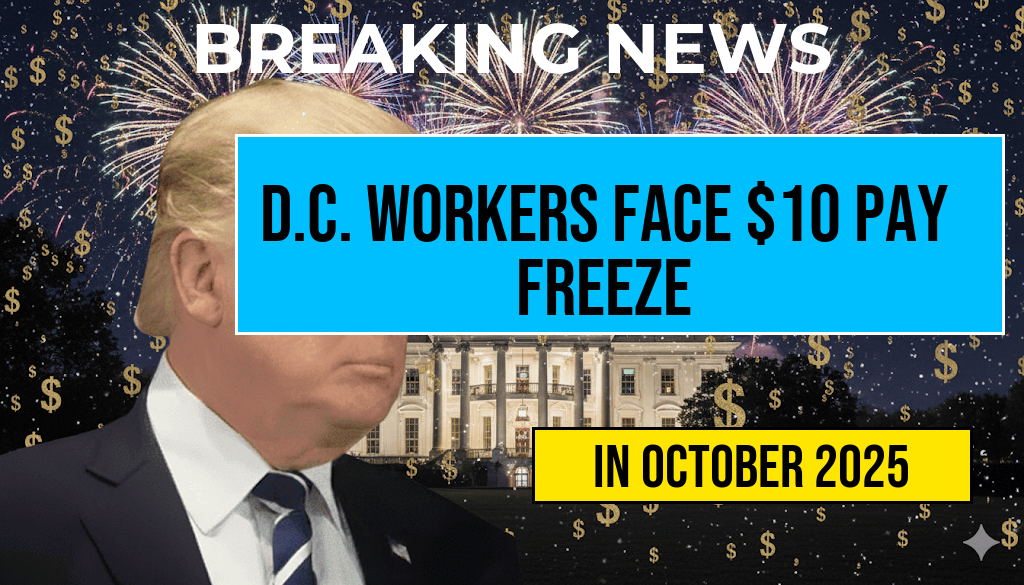The District of Columbia is facing a significant shift in its labor landscape as the city’s tipped workers confront a freeze on the $10 base pay that has been a staple of their compensation structure. This decision, influenced by rising inflation and changing economic conditions, has prompted hundreds of workers to pivot towards increasing their income through tips. As the freeze takes effect, many restaurant and hospitality employees are adapting to the new financial realities, relying more heavily on gratuities to make ends meet.
Impact of Base Pay Freeze on Tipped Workers
Starting this month, the D.C. government has implemented a freeze on the minimum wage for tipped employees, which is set at $10 an hour. This decision comes amid ongoing debates about wage structures in the service industry and the overall economic climate. As inflation continues to pressure household budgets, the reliance on tips is becoming more pronounced.
Understanding the Wage Structure
In D.C., tipped workers are allowed to earn a lower base pay, with the expectation that tips will supplement their income. The base pay freeze means that many workers will need to adapt their earnings strategy to ensure financial stability. As a result, some employees are reporting significant changes in their weekly earnings.
- Current Base Pay: $10 per hour (frozen)
- Average Weekly Hours: 30-40 hours
- Typical Weekly Earnings from Tips: $300-$500
Workers’ Reactions and Adaptations
Many tipped workers have expressed frustration with the pay freeze, citing the increasing cost of living and the challenges of relying solely on tips. Some have shared their experiences of adapting to this new reality. For instance, Maria Lopez, a server at a popular D.C. restaurant, noted, “I have to work extra shifts and pick up tables during busy hours just to make what I used to earn without this freeze.”
The shift towards tipping can create uncertainty, as tips can fluctuate based on customer traffic and generosity. This dependency on tips raises concerns about financial stability for many workers, especially those who are supporting families or paying off student loans.
Economic Implications of the Decision
Economists suggest that the pay freeze could have broader implications for D.C.’s economy. As workers shift their focus to maximizing tips, businesses may experience changes in service dynamics. Tipped workers often rely on strong customer interactions to boost their earnings, which can lead to inconsistencies in service quality.
Potential Long-Term Effects
The long-term effects of this base pay freeze remain to be seen, but some analysts warn that it could exacerbate income inequality among service workers. With an increased reliance on tips, those in high-traffic areas may thrive, while others in less busy establishments struggle to make a living wage.
Future Considerations
As the D.C. Council considers potential adjustments to the tipped wage structure, workers and advocacy groups are urging for a reevaluation of policies that impact their livelihoods. Proposals include raising the base pay for tipped workers to ensure a more stable income, as well as creating systems that better support those who rely heavily on tips.
For more information on wage structures and labor rights, interested readers can explore resources provided by the D.C. Labor Council and the U.S. Department of Labor.
Conclusion
The freeze on the base pay for tipped workers in D.C. marks a critical juncture for employees in the service industry. As they navigate this new landscape, the reliance on tips is likely to become a focal point in discussions about labor rights and wage equity. The ongoing dialogue surrounding these issues is essential for understanding the future of work in the nation’s capital.
Frequently Asked Questions
What is the current base pay for tipped workers in D.C.?
The current base pay for tipped workers in D.C. is $10 per hour, which has been frozen, meaning it will not increase despite changes in the cost of living.
How does the base pay freeze affect tipped workers’ earnings?
The base pay freeze results in hundreds of dollars weekly being shifted to tips, as workers will rely more heavily on customer gratuities to maintain their income levels.
What reasons are behind the base pay freeze for tipped workers?
The freeze has been implemented due to various economic factors and concerns about employment stability within the hospitality industry during uncertain times.
Are there any proposed changes to the tipped wage system in D.C.?
There have been discussions about potential reforms to the tipped wage system, but no immediate changes have been finalized as of now.
What can tipped workers do to advocate for better pay?
Tipped workers can join advocacy groups, participate in community discussions, and engage with local lawmakers to push for changes in the tipped wage policies and seek higher base pay.











